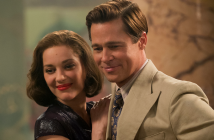
Cast: Alice Taglioni, Patrick Bruel, Marine Delterme
Director: Sophie Lellouche
Country: France
Genre: Comedy | Romance
Official Trailer: Here
Editor’s Notes: Paris-Manhattan opens in limited release tomorrow, April 12th. If you’ve already seen the film we’d love to hear your thoughts on it, or if you’re looking forward to seeing it this weekend, please tell us in the comments section below or in our new Next Projection Forums.
Alice is a Woody Allen fan, but to her the word fan would seem practically pejorative. She is an Allen acolyte, fancifully quoting his films at every turn and angrily dismissing men who suggest, at parties, that perhaps Manhattan may not have aged so well. A pharmacist, she is as keen to treat illness with DVDs as with medicine. “I’m depressed,” laments a regular customer as she arrives at Alice’s counter. “I need a pick-me-up.” Others might suggest Prozac; Alice is faster to prescribe Everything You Always Wanted to Know About Sex* (*But Were Afraid to Ask). She is unashamed in living every moment of her life through her unabashed adoration of Allen. She is, in other words, my kind of woman.
Her best scene is a knowing nod to Take the Money and Run that’s as funny for the original wit it brings to the scenario as for the cheeky charm with which it parodies that film.
 Such is the appeal of Paris-Manhattan, which squarely aims to capture the imagination of Alice’s fellow Allen fans as it entangles his brand of neurotic comedy with the framework of the French rom-com. Modelled primarily after the undervalued Play it Again, Sam, in which Allen accepts romantic advice from the spectre of Humphrey Bogart, Alice’s imagined conversations with her idol through the large poster that adorns her bedroom wall cleverly use audio from his films to craft witty new exchanges. Sophie Lellouche, making a major impression in her first outing as feature writer/director, does well to infuse tributes to Allen’s various comic stylings with her own brand of particularly French farce. Her best scene is a knowing nod to Take the Money and Run that’s as funny for the original wit it brings to the scenario as for the cheeky charm with which it parodies that film.
Such is the appeal of Paris-Manhattan, which squarely aims to capture the imagination of Alice’s fellow Allen fans as it entangles his brand of neurotic comedy with the framework of the French rom-com. Modelled primarily after the undervalued Play it Again, Sam, in which Allen accepts romantic advice from the spectre of Humphrey Bogart, Alice’s imagined conversations with her idol through the large poster that adorns her bedroom wall cleverly use audio from his films to craft witty new exchanges. Sophie Lellouche, making a major impression in her first outing as feature writer/director, does well to infuse tributes to Allen’s various comic stylings with her own brand of particularly French farce. Her best scene is a knowing nod to Take the Money and Run that’s as funny for the original wit it brings to the scenario as for the cheeky charm with which it parodies that film.
It’s the unmistakeable Frenchness of the film that allows it the distance from Allen’s oeuvre to remain fresh and avoid seeming just a pale imitation. As much as dialogue-laden walks through the Parisian streets and wistful romantic sentiment attests Lellouche’s desire to emulate the Allen style, she takes as much influence from her own country’s cinematic comedy heritage, imbuing her characters with that particularly quirky sensibility. It makes a sheer delight of Alice, to whom Alice Taglioni brings a mannerism equally lively and dour, as cold-hearted as she is quick-witted. She has a wonderful repartee with Patrick Bruel, her primary romantic interest—insisted on by her father—and a figure of multifaceted complexion in his own right.
There’s no doubt that Paris-Manhattan will be more suited to those well-versed in the work of Allen than those unfamiliar entirely, though Lellouche does her part to enmesh his influence with more beyond that. The film’s success comes in using its conceit not as a crutch, but as a means by which to enrich its own character exploration.
 It’s in the father character, and his wife—indeed the whole extended family—that Lellouche most significantly deviates from Allen’s shadow, often to a fault. Michel Aumont is a highlight as Alice’s father, whose strength in the film comes from his mono-dimensional contribution of comic tension. Alice’s mother and sister, by contrast, respectively dogged by potential alcoholism and worries over her daughter’s romantic pursuits, contribute only convolution to the narrative, their issues far too trivial to the primary character arc to ever be more than window dressing, particularly in a film only 74 minutes in length. Lellouche’s earnest effort to explore their woes is a sure tribute to the familial scope of films the like of Hannah and Her Sisters—the movie through which Alice first encountered Allen, incidentally—but it’s too half-hearted to ever be more than a mere effort.
It’s in the father character, and his wife—indeed the whole extended family—that Lellouche most significantly deviates from Allen’s shadow, often to a fault. Michel Aumont is a highlight as Alice’s father, whose strength in the film comes from his mono-dimensional contribution of comic tension. Alice’s mother and sister, by contrast, respectively dogged by potential alcoholism and worries over her daughter’s romantic pursuits, contribute only convolution to the narrative, their issues far too trivial to the primary character arc to ever be more than window dressing, particularly in a film only 74 minutes in length. Lellouche’s earnest effort to explore their woes is a sure tribute to the familial scope of films the like of Hannah and Her Sisters—the movie through which Alice first encountered Allen, incidentally—but it’s too half-hearted to ever be more than a mere effort.
There’s no doubt that Paris-Manhattan will be more suited to those well-versed in the work of Allen than those unfamiliar entirely, though Lellouche does her part to enmesh his influence with more beyond that. The film’s success comes in using its conceit not as a crutch, but as a means by which to enrich its own character exploration. Lellouche has made in her debut a movie of wit and wisdom, indebted to a forebear but not dependent on it. More of the wit comes from Alice herself than from Allen’s recycled lines, after all, and by the end—in all its predictable sweetness—we care more for her relationships to those around her than to her idol. Her understanding of the world as she progresses through the narrative, in its own charming little way, adds to our own. How nice to learn as well as to laugh.
[notification type=”star”]74/100 ~ GOOD. Paris-Manhattan does well to infuse tributes to Allen’s various comic stylings with its own brand of particularly French farce.[/notification]



